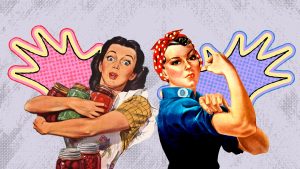2004’s Mean Girls has become one of the most iconic “high school drama” films of all time. The movie’s incredible success solidified the careers of Amanda Seyfried, Rachel McAdams, Lizzy Caplan, and—of course—Lindsay Lohan. The quirky characters and Tina Fey-penned dialogue have inspired everything from Mariah Carey songs to an upcoming musical. Even today, references to the Mark Waters’ film seem to infiltrate young peoples’ vocabularies and conversations, making it an inescapable pop culture force. So, why is Mean Girls so fetch? Why is the movie so quotable? Why does it resonate with so many people?
The film’s sexy “Jingle Bell Rock” dance and iconic one-liners do help inflate the film’s iconic status; however, its success also correlates to the realistic illustration of high school.
Although some of the characters are extensively exaggerated, fragments of them do thrive in young adult culture. This realism certainly played a role in catapulting the Mean Girls phenomenon. The characters themselves persist throughout every high school. Regina George, the passive aggressive, egotistical Queen Bee is reminiscent of many high school “life ruiners.” Mirroring so many high school bullies, she is the quintessential mean girl that viewers love to hate. Cady’s persona seems to be that of human tofu—a person completely absorbed and molded by their environment. Cady resonates with so many of us; oftentimes, in order to fit in, we become what we are not. We dumb ourselves down. We become plastic. Janice, the punky rebel, reflects those who challenge authority and tyranny; however, sometimes her tactics prove just as malicious as Regina’s. Her character poses a question regarding the morality of rebellion. When does the rebel become the corrupt?
In addition, the film proposes some real life questions regarding the definition of social “cliques.” From the first 30 minutes or so, we are introduced to Northshore’s cafeteria layout. It is a world where people are defined solely by their group of friends and interests. Stoners sit with stoners, jocks with jocks. At the end of the film, social classes are dismantled, and girl world is equalized. Burnouts sit with art freaks and plastics alike. The film comments on the unnecessary nature of high school brandings by illustrating its social consequences and promoting the benefits of its destruction. Once the class separation is torn to shreds, girl world is finally at peace.
Overall, Mean Girls is much more than its comedy. It’s a social commentary that scorns the aggressiveness of highschool society and promotes embracing a “cake of rainbows and smiles.”
Take Our Quiz to find out which Mean Girl YOU are!
[dciframe]http://quizilla.teennick.com/quizzes/24311364/which-mean-girl-are-you,500,1010,0,no,align:left; font:12px[/dciframe]
[information]Read more Tinsel Talk here.[/information]


















Be First to Comment